
Guests
- Paul Offitdirector of the Vaccine Education Center and an attending physician in the Division of Infectious Diseases at Children’s Hospital of Philadelphia.
The Trump administration is intensifying its campaign against vaccinations, with Health and Human Services Secretary Robert F. Kennedy Jr. withdrawing U.S. funding for the world’s preeminent international vaccine organization. The group, known as Gavi, the Vaccine Alliance, is the world’s largest funder of lifesaving vaccinations and says it has helped vaccinate more than 1.1 billion children in 78 lower-income countries, preventing nearly 19 million future deaths. Kennedy also recently stacked an important vaccine advisory panel with unqualified appointees, many of them holding anti-vaccine views.
“Anti-vaccine activists have been shouting from the sidelines for decades. Now they’re making policy,” says Dr. Paul Offit, director of the Vaccine Education Center at the Children’s Hospital of Philadelphia.
Transcript
AMY GOODMAN: This is Democracy Now!, democracynow.org. I’m Amy Goodman, with Nermeen Shaikh.
NERMEEN SHAIKH: We turn now to public health and vaccines. Health and Human Services Secretary Robert F. Kennedy Jr. has withdrawn a U.S. pledge to fund the world’s preeminent international vaccine organization as the Trump administration takes its campaign against vaccinations, led by RFK Jr., global. The organization, known as Gavi, the Vaccine Alliance, is the world’s largest funder of lifesaving vaccinations and says it’s helped vaccinate more than 1.1 billion children in 78 lower-income countries, preventing nearly 19 million future deaths.
On Wednesday, Kennedy claimed, without any evidence, that Gagi, quote, “ignored the science” in its global immunization campaign.
HHS SECRETARY ROBERT F. KENNEDY JR.: Unfortunately, in its zeal to promote universal vaccination, it has neglected the key issue of vaccine safety. … When the science was inconvenient, Gavi ignored the science. I call on Gavi today to re-earn the public trust and to justify the $8 billion that America has provided in funding since 2001.
AMY GOODMAN: Also Wednesday, scientists at the U.S. Centers for Disease Control rallied outside the agency’s headquarters in Atlanta to protest the Trump administration’s newly reconstituted vaccine advisory panel. It’s called the Advisory Committee on Immunization Practices, known as ACIP. RFK Jr. stacked the committee with new appointees, fired most of the others, many of them holding anti-vaccine views. He fired all 17 formerly seated members of the panel and replaced them with a smaller group of his own. Wednesday was the first day of the new committee’s meeting. This is former CDC worker Peter Cegielski, who was protesting outside.
PETER CEGIELSKI: There have been rallies here every Tuesday since the — maybe since March. But today is especially important, because it’s the first meeting of this new and, I would say, bogus Advisory Committee for Immunization Practices, ACIP. Kennedy, as most people know, fired the previous members of ACIP, and the few people that he’s put on it are not competent.
AMY GOODMAN: For more on these developments, we’re joined by Dr. Paul Offit. He’s the director of the Vaccine Education Center, attending physician at Children’s Hospital in Philadelphia, also serves as an adviser to the FDA. Dr. Offit is the co-inventor of the rotavirus vaccine, recommended for universal use in infants by the CDC, author of numerous books, including Autism’s False Prophets: Bad Science, Risky Medicine, and the Search for a Cure, as well as the book Deadly Choices: How the Anti-Vaccine Movement Threatens Us All.
Dr. Offit, thanks so much for joining us again. If you can start off by talking about this two-day meeting — the first was yesterday — and the whole issue that the people on this committee are saying they’re just reexamining the whole roster of vaccines? What does that mean? How does that affect kids in this country, adults, as well, and people around the world?
DR. PAUL OFFIT: Well, so, anti-vaccine activists have been shouting from the sidelines for decades. Now they’re making policy. We have an anti-vaccine activist and science denialist as the secretary of health and human services, who basically fired 17 people who were members of the Advisory Committee for Immunization Practices, who went through the proper vetting process, made sure they didn’t have conflicts of interest, made sure they had the expertise that could give us the advice we needed. He fired all those people.
Then what he did is he brought in eight people — now one of them backed off, so it’s seven people — who would have never passed the confirmation process, who don’t have the expertise we need to give good advice. And what they’re doing is they’re just putting forward what is typically anti-vaccine tropes, like, “Kids are getting too many vaccines too soon, so we need to reevaluate that. Why are we giving a hepatitis B birth dose?” etc., etc. And so, you’re now just seeing anti-vaccine activism move into the center of public health.
NERMEEN SHAIKH: And, Dr. Offit, in fact, the panel chair, Dr. Robert Malone, said he considers the label anti-vaxxer to be high praise. I mean, you’ve worked in vaccine information, the director of the Vaccine Education Center. What do you think explains this transformation in the perception of the effectiveness of vaccines, and not just the effectiveness, but what they’re propagating, which is the danger of vaccines?
DR. PAUL OFFIT: I think that we, to some extent, lost the trust of the American public early in the COVID pandemic. And I think two things happened. I think in 2020, when we didn’t have anything — we didn’t have antivirals until October, we didn’t have monoclonal antibodies 'til November, we didn't have vaccines ’til December — to try and stop the spread of a virus that was spread asymptomatically. And so, what did we do? We shuttered schools. We closed businesses. We restricted travel. We masked, isolated, quarantined, social distanced and tested. And I think there was a percentage of this population that thought that was massive government overreach, especially the shuttering of schools and closing of businesses.
I think the following year, when we had a vaccine, which we did by December of 2020, and that was available by January of 2021, we very quickly vaccinated 70% of this population by July of 2021, but 30% of this population didn’t want to be vaccinated. First of all, people didn’t like it that you had to have your vaccine passport, which is to say, unless you were vaccinated, you couldn’t go to your favorite bar or restaurant or place of worship, or you may be fired from your job. That, too, was, I think, seen as massive government overreach.
And I think we leaned into a libertarian left hook, and I think we’re feeling that punch. So, everything sort of fell out. I mean, people said, “Well, COVID’s not that big of a deal,” or, “Well, the vaccine is really much more dangerous than they’re telling you.” They lost the trust in the government, and they were very quick to see conspiracy.
And that’s how RFK Jr. rose into this position. I mean, what did he say when he fired those 17 people? He said they were rife with conflicts of interest, which wasn’t true. He couldn’t name one person on that committee who had a conflict of interest that in any way affected their vote. Not one. So, instead, he just had this broad, sweeping, you know, “They’re all in the pocket of industry. They’re all unduly influenced.”
And then, to extend this to Gavi, to the Global Alliance Vaccine Initiative, you couldn’t be more shortsighted. How do people think measles comes into this country periodically and can start outbreaks? It’s coming from — often from outside the country, because every year there’s millions of cases of measles. There’s almost 150,000 deaths from measles this year. And the Global Alliance Vaccine Initiative has done a lot of good at sort of stopping the spread of things like measles and German measles, etc. So, it’s hard to watch all this.
AMY GOODMAN: Dr. Offit, I want to ask you to respond to RFK Jr.'s appointee, the co-chair, Martin Kulldorff, who kicked off Wednesday's panel. He said he’s appointing a working group to look at the, quote, “cumulative effect of the children’s vaccine schedule.”
MARTIN KULLDORFF: If you have questions or concerns about the safety or efficacy of vaccines, we want to hear them. That is the scientific method, and it is natural to ask questions. That is what the CDC’s subject matter experts do, it’s what the public does, and it is what we will do. No questions should be off limits. Some media outlets have been very harsh on the new members of this committee, issuing false accusations and making concerted efforts to put scientists in either a pro- or anti-vaccine box. Such labels undermine critical scientific inquiry, and it further feeds the flames of vaccine hesitancy. As Secretary Kennedy has eloquently stated, opposing mercury in fish does not make you anti-fish, and opposing mercury in vaccines does not make you anti-vaccine. In fact, to thoroughly scrutinize and ensure the safety and efficacy of vaccines is a pro-vaccine position.
AMY GOODMAN: So, Dr. Offit, Martin Kulldorff is just saying, “We’re just looking at all of this.” But what is your response? And talk not only what it means here — again, you were referring to Gavi — what this means globally, why saying, “Evaluation is perfectly innocent and reasonable and scientific”?
DR. PAUL OFFIT: Well, that’s true. I think evaluation is perfectly reasonable. But you don’t necessarily need to evaluate things that are already clear. So, for example, when he talks about this notion that we’re just getting too many vaccines, that we need to look at the entire vaccine schedule, it shows you that he really doesn’t understand the immunology of vaccines, which is true of most of the people sitting around that table. They don’t have the expertise in virology or immunology or vaccinology.
So, for example, people say, “Look, I mean, we’re asking so much of parents of this country,” and it’s true. You know, we ask them to give vaccines that prevent 14 different diseases in the first few years of life. That can mean as many as 25 inoculations during that time and as many as five shots at one time to prevent diseases most people don’t see, using biological fluids most people don’t understand. So, there’s understandable skepticism, and that’s fair. But it’s not really the number of vaccines that you get that matters; it’s the number of immunological components in vaccines that matter.
So, by immunological component, I mean, for example, a viral protein or a bacterial protein that induces an immune response. That’s an immunological component. If you add up all the immunological components in vaccines today, it adds up to about 170. That’s less than the one vaccine that we got a hundred years ago, the smallpox vaccine, the largest of the mammalian viruses, which had about 200 immunological components. So, we have a lesser challenge to the immune system today in vaccines than we did a hundred years ago. So, I don’t think he understands any of that.
And I think when he brings these things up as, “Look, we’re just asking questions,” and brings up the mercury issue again — I mean, I was on the Advisory Committee for Immunization Practices between 1998 and 2003 when this all came up, and this has been well studied. We now have looked at children who get these vaccines that contain this mercury, so-called ethylmercury preservative, compared it to children who had the same vaccines that didn’t contain this mercury-containing preservative.
And you know, because we live on this planet and that mercury is in the Earth’s crust and that we drink methylmercury every day and that we all have methylmercury in our bloodstreams, all of us — methylmercury is in infant formula, it’s in breast milk, it’s in anything made from water on this planet — what you learned about so-called thimerosal, this ethylmercury-containing preservative, is that it doesn’t in any way contribute to a detectable amount of mercury in your bloodstream. You knew that. And then there’s now been nine studies showing that if you get these vaccines, as compared to vaccines that don’t contain this preservative, that there’s no difference in neurodevelopmental outcome. So, when he says, “Well, we’re just asking questions. We’re just looking,” we’ve already looked at this. What he’s saying is he doesn’t trust what’s happened before him.
NERMEEN SHAIKH: And, Dr. Offit, the question about the global impact of this, first, the U.S. cutting funding to Gavi, the Vaccine Alliance, and then this coupled with the fact that for multiple reasons vaccination rates in many parts of the world, including poorer countries, have come down in part because of vaccine misinformation that’s spread, and the impact on that on possible future deaths?
DR. PAUL OFFIT: Certainly. I mean, we export our fears. And Robert F. Kennedy Jr. has been a big exporter of fears. I mean, since he’s been an anti-vaccine activist for 20 years through his program, Children’s Health Defense, he puts out a lot of misinformation and disinformation.
And so, for example, Samoa is a perfect example. There was a tragedy in Samoa, where the measles, mumps, rubella vaccine is in powdered form there, so you need to dilute it in a — or reconstitute it in a diluent. Two nurses independently made a mistake where instead of using just the sort of saltwater diluent that should’ve been used, they used a muscle relaxant. They injected, independently, two 12-month-old children, both of whom died almost immediately when they stopped breathing.
So, what he did immediately, and through Children’s Health Defense, is he said, in his website and then elsewhere, “A measles vaccine is killing children in Samoa,” when it wasn’t the vaccine at all. He then went to Samoa. He met with anti-vaccine activists. He met with the president. He tried to again influence people: “Measles is killing your children.” Immunization rates dropped from about 75% to 30%, and there was a massive measles outbreak in this country of 200,000 people, 5,600 cases of measles, 83 deaths — deaths — mostly in children less than 4 years of age. He had a lot to do with that. So, that’s what misinformation can do, not only in this country, where we’re, again, seeing the biggest measles outbreak we’ve probably seen in 30 years, but in the world.
AMY GOODMAN: So, finally, 30 seconds, how are you responding to this two-day meeting, and what’s going to come out of it?
DR. PAUL OFFIT: You’re just standing back and watching what is, frankly, a clown show. I mean, I think the head of the American Academy of Pediatrics, Susan Kressly, said it best: “We’re not going to this meeting anymore. We’re ignoring this meeting.” I think most of the medical and scientific community is just seeing this for what it is, which is just another forum for anti-vaccine activists to talk about their misinformation.
AMY GOODMAN: Dr. Paul Offit, we want to thank you for being with us, director of the Vaccine Education Center, attending physician at Children’s Hospital of Philadelphia.
Up next, NATO. Stay with us.
[break]
AMY GOODMAN: “Bomb the World to Pieces” by Michael Franti in our Democracy Now studio years ago.

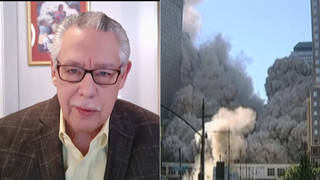
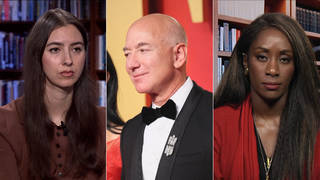
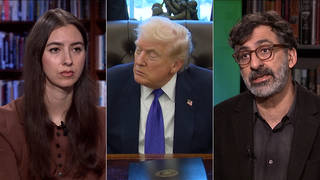
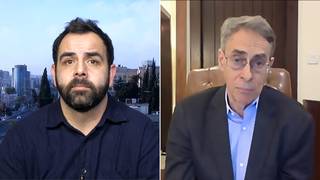







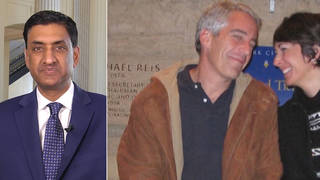
Media Options